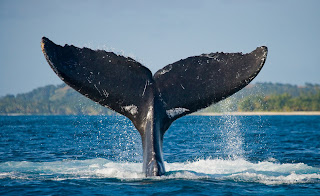Wednesday, February 14, 2018
Whale Food is Ready!
Imagine having a dinner bell ring every single time dinner was ready. This is what it is like for the Pacific grey whales off the coast of Oregon. Newly discovered snapping shrimp have been located off this coast where they make extremely loud noises clamping their claws together. When enough shrimp are together at the same time the noise is loud enough to make a sound as if it was a jet plane. The noise is generated from their two asymmetrical claws clamping together impressively fast over and over again. It was said to be done as fast as sixty miles per hour.
Whales are very sensitive to acoustics; this is why the ocean noise was being observed in the first place. When this sound was discovered off the coast of Oregon it drew the researcher’s attention right away. Whales are very sensitive to the noises around them and it can affect their behavior as well as their hormone levels. However this noise seemed to effecting the whales in a more beneficial way. Whales not only use their sight to find food but they also use their other senses as well. Due to their extremely sensitive hearing sense this noise generated by the snapping shrimp gave the whales a new opportunity in terms of locating food.
Researchers were recently observing this newly discovered noise and noticed Pacific grey whales making their way closer to that noise, supposedly to go and feed off of the shrimp. However, after further observing was done, they came to the conclusion that the whales were just using the noise to get closer to mysids for food. The snapping shrimp and mysids are found in the same kelp area of the oceans. This means that the whales can easily follow this noise made by the snapping shrimp to locate mysids to feed on. It’s almost as though the whales have a ringing noise every time they have the option of easily accessible food, like a dinner bell!
Posted by: Sarah Aboody (1)
Original article: https://news.nationalgeographic.com/2018/02/snapping-shrimp-eastern-pacific-gray-whales-feeding-mysids-oregon-coast-spd/
Subscribe to:
Post Comments (Atom)

I find it interesting that the snapping was evolutionarily beneficial to the shrimp. One would think that this behavior would not persist genetically if it attracts predators. Is the snapping of the shrimp sexually selected for? Perhaps the amount of offspring a single shrimp produces is large enough to outweigh the cost of the snapping.
ReplyDelete-Brooke Sullivan
The whales aren't actually following that noise to consume the shrimp, it just allows them to be closer to their other food source which also lives where the snapping shrimp do. However it does make sense that their predators would hear their noises and draw attention to them, so that is a good question.
Delete--Sarah Aboody
I wonder what causes the shrimp to snap in the first place. Is it occurring at certain times of the day? Or is it a constant activity? How convenient for the whales!
ReplyDelete-- Hannah Kullberg
This comment has been removed by the author.
DeleteIt actually only occurs at certain times which is what helps the whales know when they should move towards them to locate their food. It is very interesting as to how the shrimp know when to snap or what causes it.
Delete--Sarah Aboody
The sentence "Whales are very sensitive to the noises around them and it can affect their behavior as well as their hormone levels." really stood out to me. I'm definitely interested in this pathway that whales have that start with a noise and eventually ends with a specific hormonal release. I'm also interested in knowing, do whales have similar hormones to humans? For example, ghrelin is the hunger-stimulating hormone humans. Do whales use the same hormone or do they have their own?
ReplyDelete-Michael Magnant
This comment has been removed by the author.
DeleteThats a good question that I am also interested in. I wonder how the noises are actually effecting their endocrine system, but it is good to know that these shrimp must be beneficial for the whales.
Delete--Sarah Aboody
It's amazing how organisms have evolved into such intelligent beings. Pacific Grey whales must have evolved to their own advantage when it comes to feeding. It's kind of mind blowing because it makes me think what it took for us humans to evolve and adapt to become who we are today. I wasn't aware that whales were sensitive to noises around them, but now that I think about it, it makes sense that their hormone levels can also be affected. I remember hearing about how whales recognize different wavelengths/frequencies that help them communicate with one another.
ReplyDelete-Posted by Catherine Tsang (3)